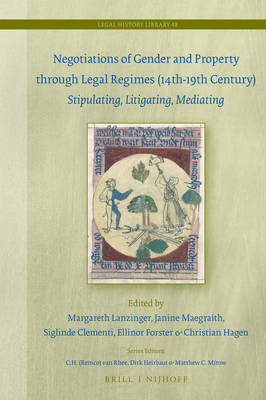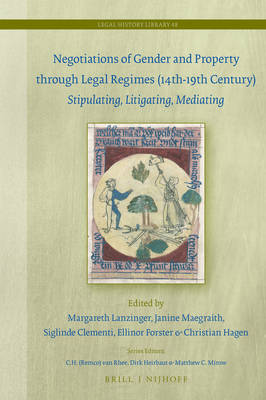
- Afhalen na 1 uur in een winkel met voorraad
- Gratis thuislevering in België vanaf € 30
- Ruim aanbod met 7 miljoen producten
- Afhalen na 1 uur in een winkel met voorraad
- Gratis thuislevering in België vanaf € 30
- Ruim aanbod met 7 miljoen producten
Zoeken
Negotiations of Gender and Property Through Legal Regimes (14th-19th Century)
Stipulating, Litigating, Mediating
€ 265,95
+ 531 punten
Omschrijving
This volume explores familial wealth arrangements and gendered property from the fourteenth to the nineteenth centuries in Italian, German and Austrian territories (including Florence, Trento, Tyrol, and Vienna), Nordic countries, Western Pyrenees, and England. Family property as capital in the form of houses, land, movables, financial assets, and rights were of great importance in the past. Arrangements of such property were characterised by a high degree of negotiating competence but likewise they entailed competition between the parties involved and were highly conflict prone. Fifteen contributors from Austria, Finland, France, Germany, Italy, and the UK address different marital property regimes in relation to the practices and legal regulations of inheritance patterns with consideration to inter-familial negotiation, conflict, and resolution.
Contributors are: Marie-Pierre Arrizabalaga, Laura Casella, Isabelle Chabot, Siglinde Clementi, Simona Feci, Ellinor Forster, Andrea Griesebner, Christian Hagen, Margareth Lanzinger, Janine Maegraith, Silvia Mattivi, Beatrice Moring, Craig Muldrew, Regina Schäfer, and Georg Tschannett.
Contributors are: Marie-Pierre Arrizabalaga, Laura Casella, Isabelle Chabot, Siglinde Clementi, Simona Feci, Ellinor Forster, Andrea Griesebner, Christian Hagen, Margareth Lanzinger, Janine Maegraith, Silvia Mattivi, Beatrice Moring, Craig Muldrew, Regina Schäfer, and Georg Tschannett.
Specificaties
Betrokkenen
- Uitgeverij:
Inhoud
- Aantal bladzijden:
- 464
- Taal:
- Engels
- Reeks:
- Reeksnummer:
- nr. 48
Eigenschappen
- Productcode (EAN):
- 9789004454187
- Verschijningsdatum:
- 30/04/2021
- Uitvoering:
- Hardcover
- Formaat:
- Genaaid
- Afmetingen:
- 156 mm x 236 mm
- Gewicht:
- 557 g

Alleen bij Standaard Boekhandel
+ 531 punten op je klantenkaart van Standaard Boekhandel
Beoordelingen
We publiceren alleen reviews die voldoen aan de voorwaarden voor reviews. Bekijk onze voorwaarden voor reviews.










